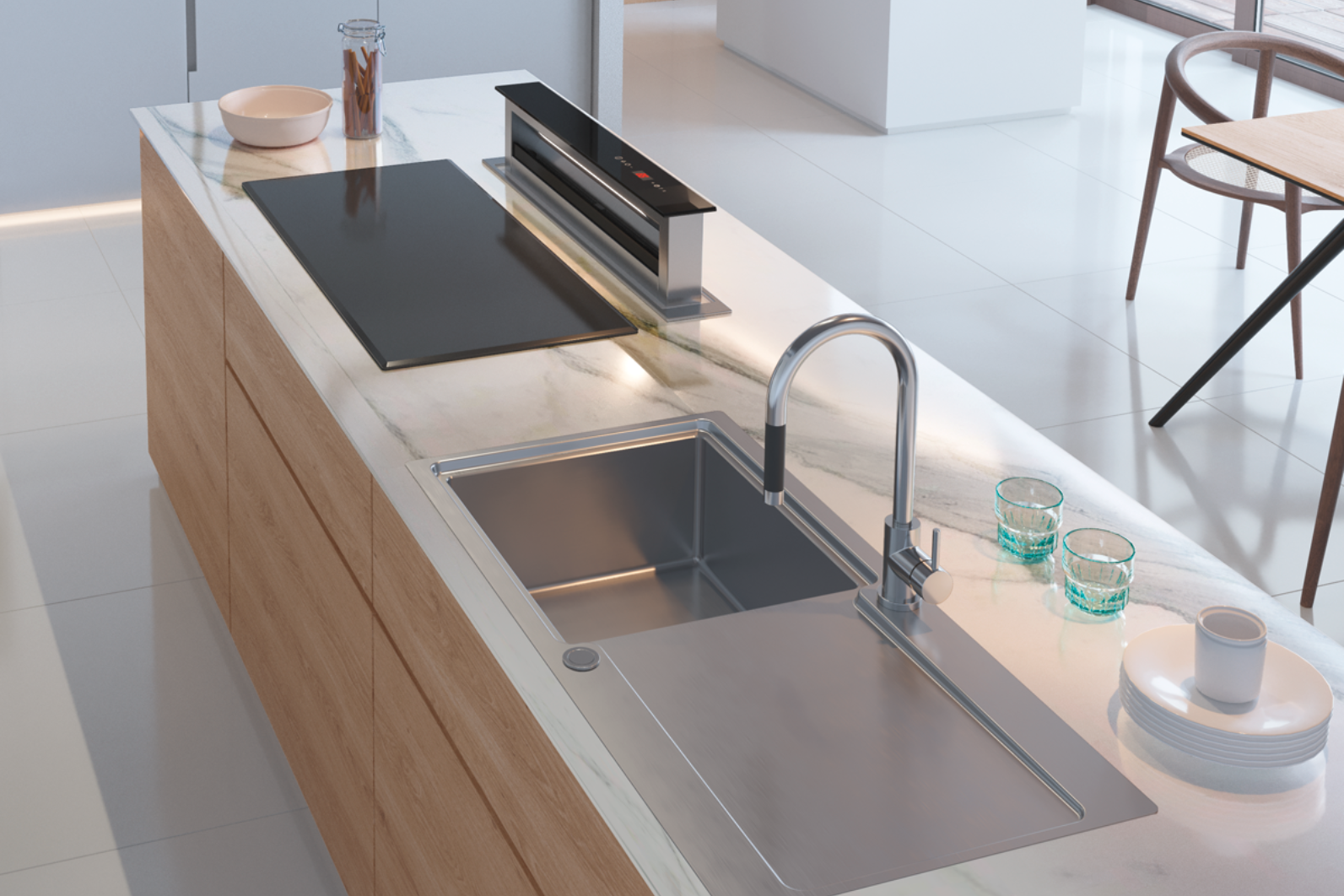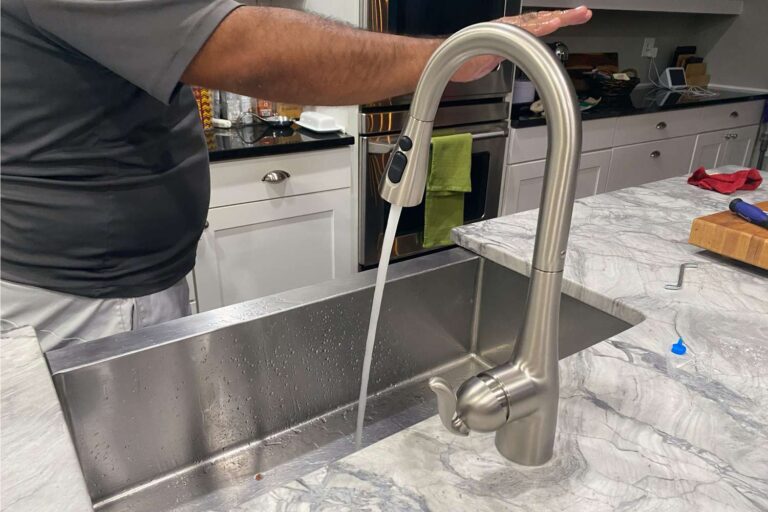As our world becomes increasingly aware of the environmental impact of daily living, sustainability has moved to the forefront of many people’s minds. The kitchen, as a central hub in most homes, is an ideal place to start when incorporating eco-friendly practices. With the advent of smart technology, there are now numerous ways to make kitchens more sustainable, reducing waste, conserving energy, and promoting healthier living. This article will explore current smart kitchen trends that prioritize sustainability, offering insights into how technology is transforming the way we cook, eat, and manage our homes.
Energy-Efficient Appliances

One of the most significant advancements in smart kitchen technology is the development of energy-efficient appliances. These devices are designed to minimize energy consumption while maximizing performance, helping homeowners reduce their carbon footprint and save on utility bills.
Smart Refrigerators
Refrigerators are among the most energy-intensive appliances in the kitchen, running continuously to keep food fresh. However, modern smart refrigerators have been engineered to significantly reduce energy usage without compromising functionality. These refrigerators use advanced cooling technology that adjusts based on the amount of food stored and the frequency with which the door is opened. Some models can even alert users if the door is left open, preventing unnecessary energy waste.
Moreover, smart refrigerators can be integrated with home energy management systems to monitor and optimize their energy consumption. This integration allows users to track energy usage over time, making it easier to identify opportunities for further savings. The ability to control the refrigerator remotely via a smartphone app also means users can adjust settings when away from home, ensuring that the appliance runs as efficiently as possible.
Induction Cooktops
Induction cooktops are becoming increasingly popular in smart kitchens due to their energy efficiency and precision. Unlike traditional gas or electric stoves, induction cooktops use electromagnetic energy to directly heat pots and pans, reducing the amount of energy lost to the surrounding environment. This method not only heats food faster but also consumes less energy, making it a more sustainable choice.
Induction cooktops offer precise temperature control, allowing for more accurate cooking and less energy waste. For example, once a pot reaches boiling, the cooktop can automatically lower the temperature to maintain a simmer, using only the energy necessary to keep the food at the desired heat level. This efficiency helps reduce overall energy consumption, making induction cooktops an excellent option for those looking to create a more sustainable kitchen.
Energy-Efficient Dishwashers
Dishwashers have also seen significant improvements in energy efficiency thanks to smart technology. Modern smart dishwashers come equipped with eco-friendly features such as energy-saving modes, which use less water and electricity per cycle. Some models can detect the level of dirtiness on dishes and adjust the water temperature and cycle length accordingly, ensuring that only the necessary resources are used.
In addition, smart dishwashers can be integrated with smart water monitoring systems, allowing users to track water usage and make informed decisions about when to run the appliance. By using these features, homeowners can reduce their water and energy consumption, contributing to a more sustainable kitchen environment.
Water Conservation Technologies
Water conservation is another critical aspect of creating a sustainable kitchen. Smart technology offers several innovative solutions for reducing water waste, ensuring that every drop is used efficiently.
Smart Faucets
Smart faucets are a revolutionary addition to sustainable kitchens, offering features that significantly reduce water waste. These faucets are equipped with motion sensors that detect when hands, dishes, or utensils are underneath, automatically turning the water on and off as needed. This touchless operation prevents water from being left running unnecessarily, saving a substantial amount of water over time.
Some smart faucets also allow users to set specific temperatures and flow rates, ensuring that water is delivered at the desired temperature without wasting time or resources. Additionally, these faucets can be integrated with smart home systems to monitor water usage, providing insights into how much water is being consumed and where improvements can be made.
Greywater Recycling Systems
Greywater recycling is a sustainable practice that involves reusing water from sinks, dishwashers, and other kitchen sources for secondary purposes such as irrigation or flushing toilets. Smart kitchen systems can be designed to incorporate greywater recycling, capturing and filtering used water so that it can be repurposed rather than wasted.
By recycling greywater, homeowners can significantly reduce their overall water consumption, easing the burden on local water resources and lowering utility bills. This practice is particularly beneficial in areas prone to drought or water shortages, where conserving water is of utmost importance.
Smart Leak Detection
Water leaks are a common issue in kitchens, leading to wasted water and potential damage to the home. Smart leak detection systems are designed to address this problem by using sensors to monitor for leaks and alert homeowners as soon as one is detected. These systems can be integrated with smart home automation, allowing for immediate action to be taken, such as shutting off the water supply to prevent further waste or damage.
By catching leaks early, smart leak detection systems help conserve water and reduce the risk of costly repairs, contributing to a more sustainable and efficient kitchen.
Sustainable Food Management
Sustainable food management is a key component of an eco-friendly kitchen. Smart technology offers various tools and solutions to help reduce food waste, promote composting, and encourage sustainable sourcing practices.
Smart Refrigeration and Storage
One of the most effective ways to reduce food waste is through smart refrigeration and storage solutions. Smart refrigerators can now track the inventory of food items inside, alerting users when items are nearing their expiration dates. This feature helps prevent food from spoiling and going to waste, encouraging more mindful consumption.
In addition to tracking expiration dates, some smart refrigerators can suggest recipes based on the ingredients currently available, helping to ensure that all food items are used before they expire. This not only reduces waste but also promotes healthier eating by encouraging home-cooked meals made with fresh ingredients.
Composting Solutions
Composting is an excellent way to manage food waste sustainably, turning kitchen scraps into nutrient-rich compost for gardens and plants. Smart composting bins are now available that automate much of the composting process, making it easier for homeowners to compost their food waste.
These smart bins can monitor the composting process, ensuring that the right balance of materials is maintained for efficient decomposition. Some models even come with features that accelerate the composting process, turning kitchen waste into usable compost in a fraction of the time it would take using traditional methods. By composting, homeowners can significantly reduce the amount of food waste that ends up in landfills, contributing to a more sustainable lifestyle.
Sustainable Sourcing
In addition to managing food waste, sustainable sourcing is an important aspect of creating an eco-friendly kitchen. Smart kitchen apps can assist in sourcing food from local and sustainable producers, reducing the carbon footprint associated with transporting food over long distances.
These apps can also help users identify and purchase sustainably produced foods, such as organic fruits and vegetables or ethically sourced meats and seafood. By choosing to buy from local and sustainable sources, homeowners can support environmentally responsible farming practices and reduce the environmental impact of their food choices.
Waste Reduction and Recycling
Reducing waste and improving recycling practices are essential components of a sustainable kitchen. Smart technology offers several innovative solutions to help homeowners manage their waste more effectively.
Smart Recycling Systems
Smart recycling systems are designed to make recycling easier and more efficient. These systems can automatically sort recyclables from other waste, ensuring that the correct materials are sent to recycling facilities. Some models even include sensors that track the amount of recyclable material generated, providing insights into how much waste is being diverted from landfills.
By making recycling more convenient and efficient, smart recycling systems encourage more consistent recycling habits, contributing to a reduction in the amount of waste that ends up in landfills.
Reducing Packaging Waste
Packaging waste is a significant contributor to environmental pollution, but smart technology can help reduce it. Smart dispensers for bulk goods, such as grains, nuts, and spices, allow homeowners to purchase and store food items without the need for excess packaging. These dispensers can be refilled from bulk purchases, reducing the reliance on single-use packaging.
Additionally, smart kitchen apps can support zero-waste grocery shopping by helping users find stores that offer packaging-free options. By minimizing packaging waste, homeowners can significantly reduce their environmental impact and contribute to a more sustainable kitchen.
Sustainable Cooking Practices
Smart appliances can also promote sustainable cooking practices by optimizing portion sizes and reducing food waste. For example, smart ovens can suggest the appropriate portion size for a given recipe, helping to prevent over-preparation and waste. These appliances can also provide tips on using leftover ingredients, further reducing the amount of food that goes to waste.
Encouraging the use of reusable and sustainable kitchen products, such as silicone food storage bags or beeswax wraps, is another way that smart technology can promote sustainability. By making these eco-friendly options more accessible, smart kitchens can help reduce the reliance on single-use plastics and other disposable items.
Renewable Energy Integration
Integrating renewable energy into the kitchen is another key trend in smart kitchen sustainability. By using renewable energy sources, homeowners can reduce their reliance on fossil fuels and decrease their carbon footprint.
Solar-Powered Kitchen Gadgets
Solar-powered kitchen gadgets are becoming increasingly popular as homeowners look for ways to reduce their energy consumption. These gadgets, which include items such as solar-powered chargers, cookers, and lighting, use the sun’s energy to operate, reducing the need for electricity from non-renewable sources.
Solar-powered gadgets are particularly useful in kitchens with access to natural light, as they can be charged during the day and used in the evening. By incorporating solar power into the kitchen, homeowners can make a significant contribution to reducing their overall energy consumption and environmental impact.
Battery Storage Systems
Battery storage systems are an essential component of renewable energy integration in the kitchen. These systems allow homeowners to store excess energy generated from renewable sources, such as solar panels, for use during peak hours or when renewable energy generation is low.
By using stored energy, homeowners can reduce their reliance on the grid and minimize their energy costs. Battery storage systems can be integrated with smart home energy management systems, allowing users to monitor and control energy usage in real-time.
Smart Grid Integration
Smart kitchens can also be integrated with the smart grid, allowing homeowners to take advantage of energy-saving programs and incentives. Smart grid integration enables kitchens to communicate with the grid, automatically adjusting energy usage based on demand and availability.
For example, during times of high demand, a smart kitchen can reduce its energy consumption by delaying the operation of certain appliances or switching to stored renewable energy. This integration helps balance the grid and reduces the overall environmental impact of energy consumption.
Eco-Friendly Materials and Design
Sustainable materials and design practices are essential components of a smart, eco-friendly kitchen. By choosing materials and design elements that prioritize sustainability, homeowners can create kitchens that are both beautiful and environmentally responsible.
Sustainable Building Materials
Using sustainable building materials in kitchen design is a growing trend as more homeowners seek to reduce their environmental impact. Materials such as bamboo, recycled glass, and reclaimed wood are popular choices for countertops, cabinetry, and flooring.
These materials are not only eco-friendly but also durable and stylish, making them a great choice for sustainable kitchen design. Additionally, using low-VOC (volatile organic compounds) paints and finishes can improve indoor air quality, contributing to a healthier home environment.
Smart Lighting Solutions
Lighting is another important aspect of sustainable kitchen design. Smart lighting solutions, such as energy-efficient LED lights, offer both environmental and financial benefits. These lights use significantly less energy than traditional incandescent bulbs and have a longer lifespan, reducing the need for frequent replacements.
Smart lighting can be integrated with daylight sensors, automatically adjusting the brightness based on the amount of natural light in the room. This not only reduces energy consumption but also creates a more comfortable and inviting kitchen environment.
Modular Kitchen Design
Modular kitchen design is a trend that emphasizes flexibility and sustainability. Modular kitchens are designed with components that can be easily rearranged or replaced, reducing the need for extensive renovations and minimizing waste.
This approach allows homeowners to adapt their kitchens to changing needs and preferences without the environmental impact of a complete overhaul. By using sustainably sourced materials for modular components, homeowners can further enhance the eco-friendliness of their kitchen design.
Future Trends in Sustainable Smart Kitchens
As technology continues to advance, the future of sustainable smart kitchens looks promising. Emerging trends in AI, green technology, and consumer behavior are set to further enhance the sustainability of our kitchens.
AI and Machine Learning for Efficiency
Artificial intelligence (AI) and machine learning are poised to play a significant role in the future of sustainable smart kitchens. These technologies can predict and optimize energy and resource usage, reducing waste and improving efficiency.
For example, AI-powered appliances can learn a homeowner’s cooking habits and adjust settings to minimize energy consumption. Machine learning algorithms can also analyze food inventory and suggest ways to reduce waste, such as meal planning or ingredient substitutions.
Advancements in Green Technology
The continued development of green technology will drive further sustainability in smart kitchens. Innovations such as advanced water filtration systems, biodegradable materials, and energy-efficient appliances are likely to become more widely available and affordable, making sustainable kitchen design accessible to more homeowners.
As these technologies evolve, the potential for achieving zero-carbon kitchens becomes increasingly attainable. The integration of renewable energy sources, smart home automation, and sustainable materials will create kitchens that are not only environmentally friendly but also highly efficient and cost-effective.
Consumer Behavior and Sustainable Choices
Ultimately, the success of sustainable smart kitchens depends on consumer behavior. As awareness of environmental issues grows, more homeowners are making conscious choices to reduce their environmental impact. Smart technology can support these efforts by making it easier to adopt sustainable practices, such as reducing waste, conserving energy, and choosing eco-friendly products.
Educating consumers about the benefits of sustainable kitchen technology and encouraging sustainable habits will be key to driving the adoption of these practices. As more people embrace sustainability in their kitchens, the impact on the environment will be significant, contributing to a healthier and more sustainable planet.
Conclusion
The integration of smart technology in kitchens is revolutionizing the way we think about sustainability. From energy-efficient appliances to water conservation technologies and sustainable food management practices, smart kitchens offer numerous opportunities to reduce our environmental impact and live more sustainably.
By staying informed about the latest trends and innovations in smart kitchen technology, homeowners can make better decisions that contribute to a more sustainable future. Whether it’s through investing in energy-efficient appliances, adopting water-saving technologies, or choosing eco-friendly materials, the choices we make in our kitchens can have a lasting impact on the environment.
As we look to the future, the continued development of smart technology and green innovations will further enhance the sustainability of our kitchens. By embracing these trends and making conscious choices, we can create kitchens that are not only functional and stylish but also aligned with our commitment to protecting the planet.




